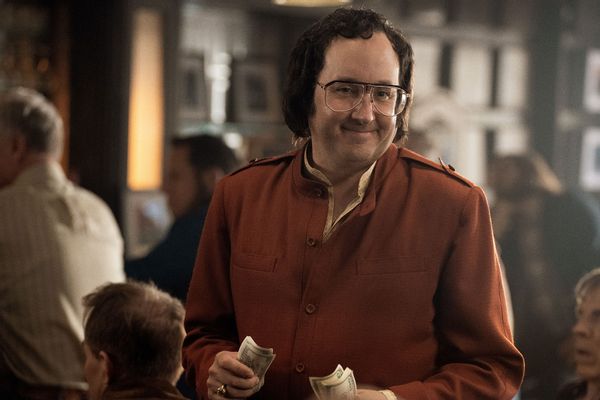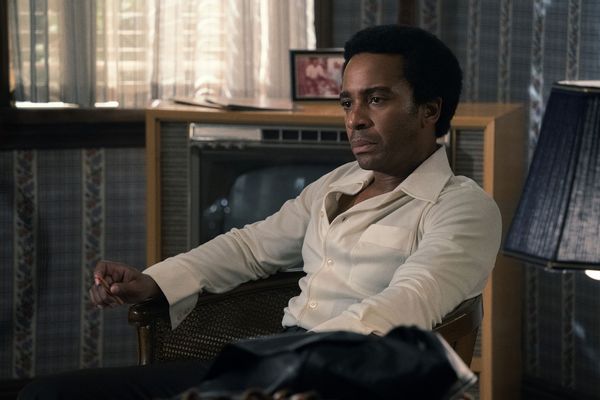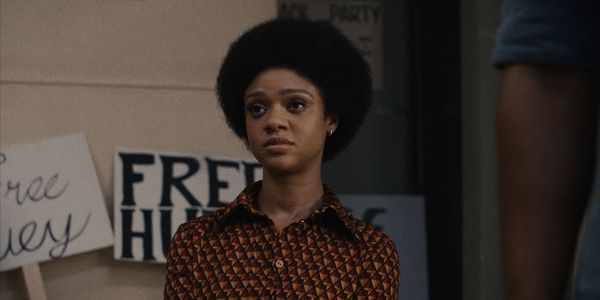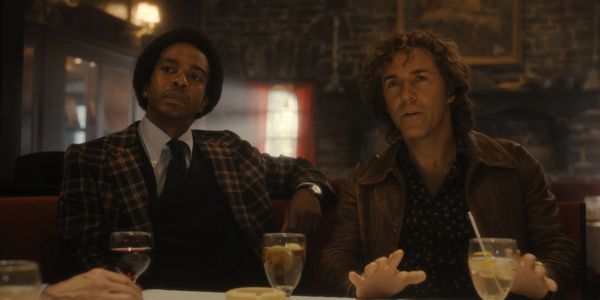
Huey P. Newton is an icon in American history but despite his lasting, impactful legacy, he was also just a man. Alongside co-partner Bobby Seale, the two college students founded what would go on to be the revolutionary Black power and liberation group, the Black Panther Party in 1966.
Newton and Seale based their politics on teachings from Malcolm X, socialist and communist ideology and championed the self-determination and defense of Black people by taking up arms. However, while those may be the founding principles of the Panthers, their cause served so much more than their misrepresented, violent tactics. In their Bay Area community, they built a sanctuary for poor Black people, starving and illiterate Black children and created a unified Black community that relied on each other – not the government or larger white America that rejected, segregated and brutalized Black people.
However, that's only a piece of the story told in Apple TV+'s new series "The Big Cigar." While Newton was a civil rights leader in his own right, he suffered from stints in and out of jail, resulting in the "Free Huey" movement and the federal government's surveillance, infiltration and discrediting of political leaders in a heightened anti-communist, Post-McCarthy era America, known as COINTELPRO. Notable figures the government spied on were leaders like Martin Luther King Jr., Malcolm X and Panther members like the late Fred Hampton and Eldridge Cleaver.
During this tense political and social climate, Newton was charged with the murder of a 17-year-old girl by police. To escape the murder charges and an impending trial, Newton had plans to flee to Cuba. However, in a ploy to get Newton to Cuba safely and evade authorities, one of Newton's friends, an unlikely movie producer Bert Schneider financed a fake film production to aid in Newton's fight for justice. The Apple TV+ series "The Big Cigar," based on a 2012 Playboy article written by Josh Bearman, follows Newton's struggles and triumphs as a leader but also Newton's journey to Cuba with Schneider's help.
Salon talked to the show's executive producer, showrunner and writer Janine Sherman Barrois about how "The Big Cigar" highlighted how Newton may have been a civil rights leader and icon but also showed "these things that encompass a human being." Read more of our conversation below:
The following conversation has been lightly edited for clarity and length
How did this story of Hollywood producers Bert Schneider and Stephen Blauner creating a fake movie production to aid Huey P. Newton to Cuba come to you? Is it a piece of history you knew before the show came into development?
It's actually something I learned along the way. I went to Howard [University.] I have always been obsessed with trying to do a Black Panther story and I was writing and showrunning "Claws" and I was sitting on the set late one night, and a PA brought me an envelope and said, your agent said you have to read this article by tomorrow. And I read it and it was Josh Bearman's Playboy article about Huey Newton's escape to Cuba with the help of Bert [Schneider] and Steve Blauner and Hollywood. I just was blown away. I thought it was so funny, that it was a crazy way to tell a period piece. It was also educational. It had these pockets where you could dip in and really contextualize the Black Panthers.

It's so interesting. So Warner Bros. had optioned the article so we had to use who was in the article and using research from Bearman who had talked to Elaine Brown, David Hilliard, Gwen Fontaine and maybe a few others. Then some other people in our staff had done projects with Panthers, and we relied on that research as well. So it was heavily researched. Ultimately, when we showed it to Fredrika Newton, she was very proud. Clearly, this is not the biopic of the Panthers, this is like a slice of pie, a slice of their history in that it's about Huey's escape to Cuba, but the fact that we were able to let an audience who might not know what Huey and Bobby Seale and all of them, did, those scenes helped bring that story to life.
What was the process like for casting the role of Huey? Did it take a while? How did you finally land on Andre, and why is he the right person to play Huey?
Andre was truly the only choice to play Huey. We put a feeler out to see whether he was interested. Our agents said not only is he interested, he has an available window at a certain time period. There was no audition, there was sort of an overture, an overture back of, "Yes, I'd be interested," and that it was just a done deal. He is truly one of the greatest actors of our time. He's just a brilliant actor, and he brought all the layers and gravitas to this part. That blew us away every single day on set. It's one of the biggest takeaways of the show for me to have been able to work with Andre and to see his magic daily.
Also, another powerhouse, Don Cheadle directs two episodes this season. How and why was he brought onto the project? What did he bring?
We needed an amazing artist to bring to life the first two episodes. Don is a phenomenal director. He created a vision that took us through basically three time periods. We got him first then Andre. It was Don then Andre locked in. But we had seen his work and his phenomenal movie "Miles Ahead." And then he had also directed episodes of "House of Lies" and "Black Monday" and he just understood the tone. It's a tricky tone because we want to have drama, but we also want to have humor.
Don knew how to handle the tone without letting the humor capsize the drama and the stakes that the Black Panthers were facing. You can't really compare the two. The Black Panthers had their life on the line every single day. Huey Newton was fighting for the Black community, fighting for equality. And he was doing it in a way where there were real stakes. The government was after him. COINTELPRO tactics were being used to try to take him down. We never wanted that to be equated to what it's like to make a movie in Hollywood or come from the privileged background that Bert came from, as a child of the head of a studio. So he just kept his eye on the ball and when you witness the collaboration between Cheadle and Andre Holland and you can see how great he is with actors, as witnessed by the tour de force performance of Andre Holland.

We wanted to show how a small idea on a college campus of two college kids – of Huey Newton and Bobby Seale – turned into the Black Panther Party. They decided to open law books and use the Second Amendment to their benefit, to police the police, to stop police violence. They then made this decision, Huey, to move the party toward the social programs. We really wanted to show that movement of, this is the way to get equality in the Black community and in poor communities across the country. If we have food in our kids' stomachs before they go to school, they can actually learn better if we have housing programs, medical clinics, all of those things. So while we wanted to show what it was like to emerge as a leader in the movement, we also wanted to show you all of the sort of constraints that were put upon him because he was trying to make change.
So we show his arrest. And then we show that he was in solitary confinement, which we now know, he was there for three years. We know that is a form of torture. He came out of solitary confinement after three years of being exonerated and he became an icon. We wanted to show how not only do you have this idea, but now you're a celebrity, you're an icon in the Black community. There's a "Free Huey" movement and all of the pressure that was headed toward him. That pressure leads with how do you lead the party? How do you keep the party going in the right direction? How do you not become paranoid? In his case, he was paranoid from the COINTELPRO tactics. And how do you move ahead? And so all of these layers were important. We also wanted to humanize them. So many times you see civil rights leaders, they are not humanized. And we wanted to show him laughing, falling in love. We wanted to show him getting married. We wanted to show these things that encompass a human being.
When you wrote for Huey, how did you want to depict how he wanted to use violence for the cause? Did it shift over time? He championed the cause’s more social benefits and programs because he felt like that’s where the future of the party was . . .
Policing the police with the guns was the way they originally wanted to move the party. We show the transition from when he made a decision that he no longer wanted to police the police with guns, and he wanted to move to the social programs. I think after Lil [Bobby Hutton's] death and after the police continued to come down on the Black community, he made a decision that these arms might not be the way to get revolution. Revolution might be in education. It might be in these social programs. It might be as you'll see a subsequent episode running for office. These were all of the questions and challenges he was facing.
Could this have been the reason why he was misconstrued by his own people and the general public?
A lot of times when people latch on to an image, and we talk about iconography, we talked about what it's like to make an icon when he's sitting in the chair. He's holding the gun and a sphere. That image with the media, and with seeing them marching with guns, made it seem like they are some militant group. What people don't know and what they didn't extract from that in history was that they were using the right to bear arms as a way to protect the Black community. But it was spun like "these crazy Black people are starting a military to overthrow us," and that's not what it was. We show the change in him. But we also a lot of people don't know how gun control laws started. They don't know that there was a moment where the Republicans were totally for gun control, and that was when the Panthers marched on the [California] state capitol when [Ronald] Reagan was there. We wanted to show the movement. And then we wanted to show as you can see in Episode 2 the kind of tension with Eldridge Cleaver, as they were all trying to figure out what was the best way to move forward.

He's a complicated figure. As a woman and as a writer and showrunner I thought it was important that we take a snapshot of who he was as a man. And we definitely show that women were attracted to him. He was attracted to women, we show that. We show the complications with addiction, and we start to scratch the surface of who he was as a person as he struggled with addiction and as he struggled through making change. We're not doing the five-hour biopic on him. We are giving you a glimpse into who he was as a man and hoping that somebody will pick up the baton and dig deeper into not only the whole movement into him and all of the years that he was alive, fighting for us.
Another interesting part of the show is the women who held the party down. You have fictional characters like Teressa Dixon played by Moses Ingram. She is one of Huey’s closest friends and something more as well. What was it really like for women in the party, and how did you want to portray it in the show?
Well, again, because we had the rights to the article, and we were only doing a bird's eye view of the party. We could not unpack all of the contributions of all the amazing women — that story needs to be done. We wanted to show that when he was making the decision to leave the party, it was getting handed over to women. We wanted to acknowledge that Elaine Brown was going to take over in the party but we didn't dramatize her. We also wanted to show that Teressa was a version of a strong woman that was within the party. You see other characters outside of the bar when the police bite, you see another woman who is actually Don Cheadle's daughter, she exemplifies the strong Black, female Panthers as well.
And then Gwen Fontaine, who was also a Panther is the confidant and she is the person who risked her life. She risked maybe never seeing her kids again. She risked all of that to go with Huey on this journey, to hopefully make it to exile in Cuba. And so we wanted to show that she was a woman who had his ear, but also who was there during this, probably one of the most challenging times in his life. I don't know but that was what I would think but she was there for that. And we wanted to show that love story and show Black love dramatized through this journey.

Huey and Bert, were very good friends, and we wanted to depict Bert as being this rebel who wanted to also make change in Hollywood. He had made these incredible films that had shifted moviemaking, whether you look at "Easy Rider" or you look at "Five Easy Pieces" or any of his films and the documentary, which you see him making through this piece, which is "Hearts and Minds" when she went on to win the Oscar for. There was a lot of people in Hollywood that were watching their TV seeing Black people being killed, seeing the disparity coming out of segregation. There were a lot of people, and those people in Hollywood ranged from everyone from whoever that is, you could say, Billie Holiday wrote songs about it. Diahann Carroll, all of these people – and so Bert wanted to get involved. But he also knew that he came from a privileged life where getting involved does not mean becoming the front and center of something that is not necessarily your story, but he also knew that he couldn't sit on the sidelines.
So when you see Bert trying to give money, trying to be the word that had not emerged yet in the canon, but an ally. You know what I mean, that's not a word of that time period. But he's just trying to figure out "What do I do? How do I assist, but not get in the way?" And so he approached Huey the way he approached his films and his stars: "I am the producer. I'm gonna give you some money." Like he gave Dennis Hopper money. "I'm gonna give you some money, you go and change the world."
For some people changing the world was making a film. For Huey, it was adding to the finances that were assisting the Panthers. [Bert] at no time gave advice or leaned in on how to make things better for Black America. He understood that Huey was a revolutionary, and Huey was the person in the movement and all the Black Panthers were daily fighting. But he wanted to let some of his financial resources assist where they could assist. So Alessandro [Nivola] brought this really layered performance where you see him kind of ease back. Huey is the star, and he's just trying to figure out what can you do, which is the question I think everyone tries to figure out when they want to make change. It's like, what can you do? That's what you see him ponder through this: It's like, "What can I do? And how can I not get in the way? And how can I also not be looked upon as one of those people who didn't do anything?"
Bert is part of 1975 Oscar’s protest history because he read a letter from a Vietnamese soldier in his speech. What about this was a symbol of his moral center? Did “Hearts and Minds” really change people’s perspectives about the war?
When you look at what he did at the Oscars, when you look at I think there was a fight backstage where he got punished . . . When you look at the [Daniel] Ellsberg stuff, all of it speaks to Bert was a guy who stood up and spoke out when a lot of people were fearful of speaking out on anything. He is part of a long history of people in Hollywood, who at different times use their platforms to speak out against what they perceived as injustices. And so I think you you saw that with us with Black Lives Matter, people putting the black square on or going out into the streets or marching, and I think Bert did that throughout his life. You know, that is part of the reason why, you see these two men became friends because clearly Huey must have seen that Bert was real and his heart was in the right place. I think that's important for I think coming together is part of all of the movements. It's just people have come together at different times.
I feel like we get a glimpse of what filmmaking is like through through Burt's eyes. How does filmmaking amplify the revolution and its messaging?
We as writers, as filmmakers, as directors, as creatives in Hollywood, we might not be on the frontlines daily fighting the way the Black Panthers fought in their community daily and put their lives on the line. But what we can do is tell stories that reflect what was happening in history. Filmmaking has always done that, it has always held up a mirror to society. And in this case, while we try to hold up a mirror so again, someone can make that epic piece and you can get a hint on the Black Panthers, but also that you learned about what it was if you're a revolutionary to have to flee this country and try to run to exile. We wanted to hold that up. But filmmaking will always tell the stories, and as stories are getting challenged in books, and what you can learn about race and whether it's slavery, civil rights, women's rights, LGBTQ+ rights. As those things are getting challenged of what you can learn in school, it's more imperative than ever that kids will be able to access these projects so that they can look further and do a deeper dive, and so that they're not forgotten.
People's differences in politics can result in many different actions – we see this with protesting today with BLM, Pro-Palestine and the splinter in America’s own left. What did you want to depict about the impact of the Black Panthers?
We wanted to shine a light on their great work — their work continues the baton. It has been passed on to Fredrika Newton, who eventually when Huey gets back from Cuba, he and Gwen eventually get divorced and he marries Fredrika, who was also a Panther. She holds the baton of the Huey Newton Foundation. When you look at the work she is doing in Oakland, and all of the activists in Oakland, you can see that it's imperative for all of us to get involved to help change or make the world better.
At the end of the show, you flash forward to the reality that in 2024 there are still plenty of reasons why we need to continue to protest and demand justice. Why was it important to look back at the past and show that there is still work to do now in the present?
For the guys, for Jim and Josh, it started 20 years ago, then 12 years ago. I mean they have long standings with it. But for me, this project has been six years. And so it started in 2018. While we were in the writers' room on the show, we went through 2020. We went through Black Lives Matter and we're still in it. We're still in the struggles that came out of Black Lives Matter. It was just important for us to say what they were fighting for back then. That's why they decided to get in the streets; it was to stop violence and in this same vein is why people throughout the world got in the streets after the murder of George Floyd, Breonna Taylor and Michael Brown. It is the same thing that occurred that got people in the streets protesting. We wanted to show you what happened in history but also show you that history sometimes repeats itself. It's up to you to make change in your own community to vote, to get involved, to get active if you want to see the world become a better place.
"The Big Cigar," which premiered May 17, is streaming on Apple TV+ with new episodes released each Friday.







